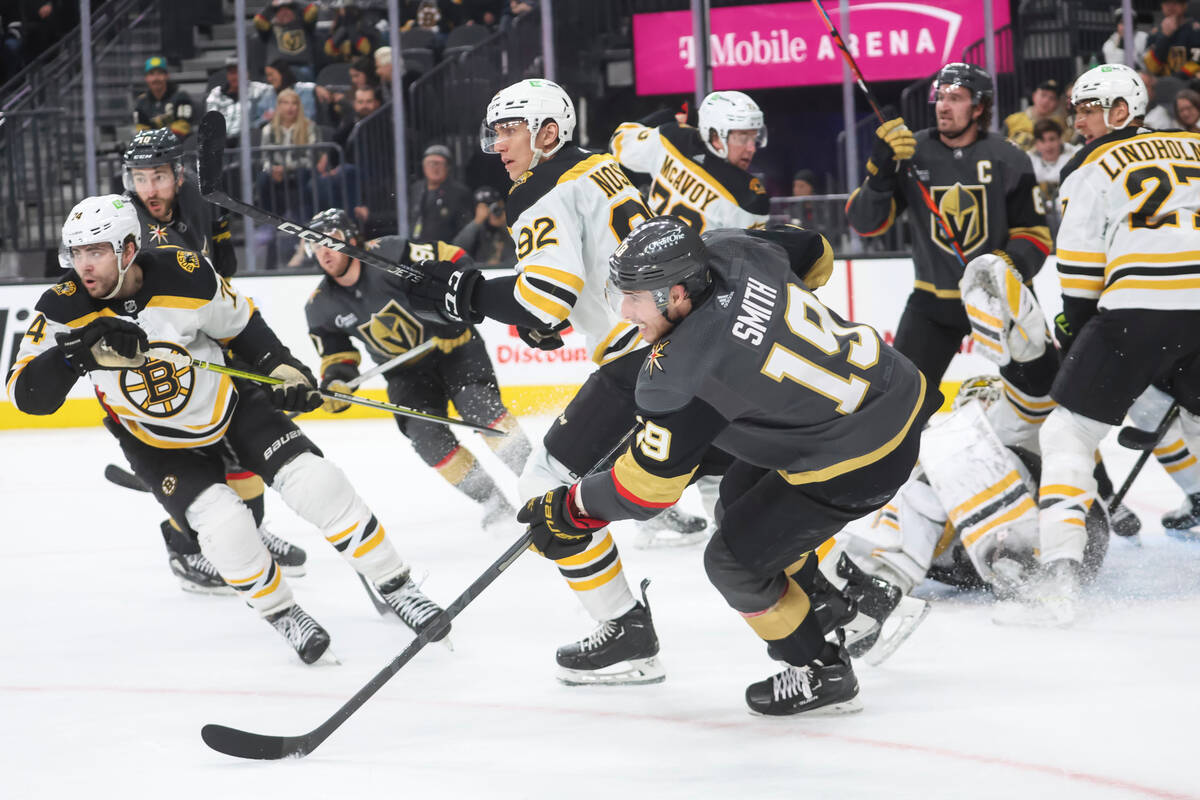Golden Knights get results on penalty kill with aggressive play
Reilly Smith stood at his locker attempting to explain one of the Golden Knights’ worst performances of the season.
The Knights allowed three power-play goals in a 5-1 loss to the Vancouver Canucks on Nov. 26 at T-Mobile Arena, something they had done only three times in the previous four seasons.
“We’re playing a little bit too passive,” Smith said. “Sometimes our instincts are what you need to work off. Right now we’re in between a lot. It cost us that game for sure.”
It felt like rock bottom for a struggling Knights’ penalty kill. Turns out, it was.
Since then, the team has had a remarkable short-handed turnaround. The Knights ranked 25th in the NHL (73.7 percent) on the penalty kill after the Canucks loss. They’re up to 15th (78.9 percent) now. They’re 44 of 52 in their past 19 games, in part because they’ve found the aggression Smith was looking for.
“We’ve been trying to pressure up-ice the whole year,” Smith said Wednesday. “Just recently we’re getting the whole group of us on the same page doing it. It’s easy to beat one guy pressuring up ice. But when you have three or four, it makes it a lot harder.”
It’s no surprise it took the Knights time to iron out their penalty-kill details.
First-year coach Bruce Cassidy and assistant John Stevens arrived with new ideas for how the team should play short-handed. Many of those worked for Cassidy in Boston, where the Bruins had the league’s third-best penalty kill during his six-year tenure.
The Knights needed time to adjust. Former coach Pete DeBoer didn’t ask them to pressure up-ice often. He focused on disrupting entries at the blue line, then getting aggressive if the puck entered the defensive zone.
Cassidy’s philosophy is a little different. The Knights are attempting to disrupt their opponent’s power-play breakouts more often to see if they can shut down a play before it starts. They’re also still aggressive in their own zone, but have to pick their spots.
Center Nicolas Roy said, for example, that the Knights won’t stretch their defense to chase the puck if their opponents have possession along the boards.
It took time for players to figure out when to get after it and when to stop. They needed reps to get all four penalty killers reading plays the same way, because otherwise they could give opposing teams gaps to exploit.
“Most penalty kills have a philosophy: ‘If one guy goes, everyone goes,’” Smith said. “When one guy is aggressive, everyone has to go, too, and we’ve been a lot quicker doing that.”
Things started to click after that Vancouver game. The Knights have the NHL’s fifth-best penalty kill (84 percent) since Dec. 1 and have allowed three power-play goals in their past 14 games.
Their confidence in when to be aggressive is a major factor. It’s disrupting their opponent’s timing and creating takeaways, which has allowed the team to clear pucks successfully to the other end of the ice.
The Knights understand their mentality can burn them at times. But their recent hot stretch has empowered them to keep trusting their instincts when there’s a chance to wreak havoc.
“Sometimes you’re going to get scored on when you’re too aggressive,” defenseman Alex Pietrangelo said. “But we’d rather (do) that because it’s harder to play against, it’s easier to frustrate opposing power plays.”
NHL All-Star Game coaches
The NHL announced Wednesday that Cassidy will coach the Pacific Division for the Feb. 4 game at Sunrise, Florida. DeBoer, the coach of the Dallas Stars, will lead the Central Division.
Contact Ben Gotz at bgotz@reviewjournal.com. Follow @BenSGotz on Twitter.
Up next
Who: Panthers at Golden Knights
When: 7 p.m. Thursday
Where: T-Mobile Arena
TV: AT&T SportsNet
Radio: KKGK (98.9 FM, 1340 AM)
Line: Knights -138; total 6½
Golden Knights lose Leschyshyn
The New York Rangers claimed center Jake Leschyshyn off waivers from the Golden Knights on Wednesday.
Leschyshyn, 23, had six points in 63 games with the Knights in the past two seasons. He was a second-round pick in the team's first draft in 2017.
"I wish him all the best in New York," coach Bruce Cassidy said. "Sometimes that's what a player needs is an opportunity somewhere else to get more minutes. We'll see with Jake in his case. I've got nothing but good things to say about him."
Ben Gotz Las Vegas Review-Journal














